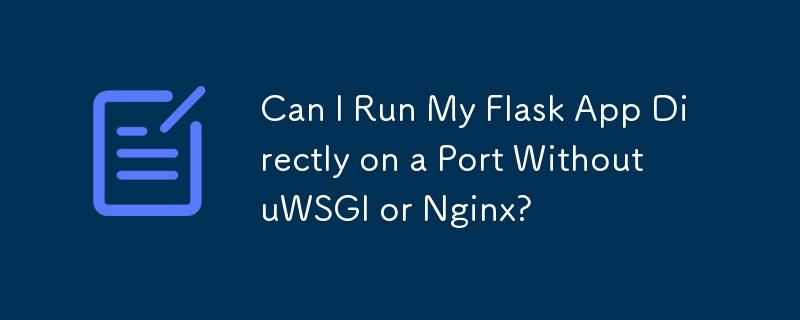Home >Backend Development >Python Tutorial >Can I Run My Flask App Directly on a Port Without uWSGI or Nginx?
Can I Run My Flask App Directly on a Port Without uWSGI or Nginx?
- Mary-Kate OlsenOriginal
- 2024-12-15 19:42:16422browse

Bare Flask on a Port: A Practical Solution for Low-Traffic or Private Apps
One common misconception among developers is that a WSGI server and an HTTP server are mandatory for deploying a Flask application. While this is true for production-grade applications that expect substantial traffic, it may not be necessary for smaller or private environments. This article aims to clarify the misconceptions surrounding this topic.
Understanding the Role of a WSGI Server
When you "run Flask," you are essentially invoking Werkzeug's development WSGI server, which is handed your Flask application as the WSGI callable. This development server serves the purpose of providing a convenient and accessible way to test and debug your Flask application locally. However, it is crucial to note that the development server is not designed for production-grade usage. Its primary limitations include:
- Reduced efficiency
- Compromised stability
- Absence of crucial security mechanisms
- Insufficient support for the full range of HTTP server features
Therefore, when deploying your Flask application to a production environment, it is highly recommended to switch from the Werkzeug dev server to a dedicated production-ready WSGI server such as Gunicorn or uWSGI.
The Merits of an HTTP Server
The primary function of a WSGI server is to communicate with the application. While it may also come with an HTTP server, it will inevitably fall short of the robustness offered by standalone production HTTP servers such as Nginx or Apache. The dedicated HTTP server provides additional functionalities, such as:
- Handling of HTTP requests
- Content negotiation
- Web traffic optimization
- Resource management
- Security measures
The Benefits of Running Flask on a Port without uWSGI or Nginx
In cases with low traffic or solely internal applications, it can be viable to run your Flask app without uWSGI or Nginx. This approach is beneficial for:
- Lower Resource Consumption: Eliminating the need for additional processes (WSGI server and HTTP server) reduces the resource utilization overhead.
- Simplified Deployment: The absence of WSGI and HTTP servers makes the deployment process more straightforward and less error-prone.
- Cost Savings: Avoiding the use of third-party services or infrastructure can potentially lead to cost reductions.
Conclusion
While a WSGI server and an HTTP server are essential components for production-ready Flask applications with high traffic, they may be unnecessary for low-resource environments or private deployments. By understanding the limitations of the Werkzeug dev server and the benefits of using Flask on a bare port, developers can make informed decisions to optimize their application deployment strategy.
The above is the detailed content of Can I Run My Flask App Directly on a Port Without uWSGI or Nginx?. For more information, please follow other related articles on the PHP Chinese website!

